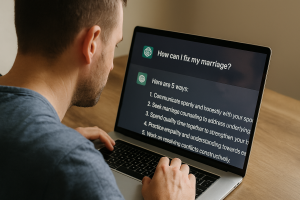
AI dependence didn’t begin with a robot invasion. It started quietly—with a single question to ChatGPT.
You didn’t hand over your brain. You just asked for help—once.
And then again. And again.
Before you knew it, you were checking with AI before sending texts. Rewriting your bio with a prompt. Running your emotions past a language model before confronting your partner. It felt smart. Efficient. But beneath the convenience was something else:
A quiet surrender.
This is a story not about robots taking over the world. It’s about something smaller—but far more personal: the slow, subtle outsourcing of our confidence, creativity, and even decisions to machines that don’t sleep, don’t judge, and never hesitate.
It starts small. You’re about to write a message—something you’ve done thousands of times. But now, there’s a voice in your head:
“Better just check with AI first.”
So you do. And what it returns feels… cleaner. Sharper. Maybe even better than you could’ve done on your own. So next time, you ask again. And then again.
Soon, you’re not just double-checking your words. You’re double-checking yourself.
This isn’t help. It’s handover.
There’s a man—I won’t name him—who confided that before confronting his wife about their growing distance, he asked GPT how to frame the conversation. Not for grammar. For guidance.
“I just didn’t trust myself to say it right,” he said.
He’s not alone.
People are asking machines how to handle divorce, grief, parenthood, family feuds—things soaked in soul. And AI, like a mirror with perfect posture, replies without stammer or sweat.
But it doesn’t know your grandmother’s laugh. Or the silence in your living room. It doesn’t know you. Not really.
Yet we let it shape the words we use to express our deepest truths.
We used to fear AI would take our jobs.
Now it’s taking our judgment.
We no longer write drafts, we write prompts.
We no longer form opinions—we ask what others are asking.
This isn’t AI writing your emails. This is AI shaping your personality.
This isn’t AI writing your emails. This is AI shaping your personality. And that’s the real danger of AI dependence—we forget what our own voice sounds like.
When you stop being the starting point—when you wait for GPT to tell you what’s “better”—you’re no longer author. You’re editor of something that was never yours.

AI is a reflection, not a revelation. It shows you patterns, not purpose.
So here’s the rule:
Create first. Consult later.
If something feels messy, human, flawed—that’s probably a good sign. That means it’s you.
Let AI polish your voice. Don’t let it replace it.
Staying human in the AI age isn’t rebellion—it’s wisdom. Here’s how:
Set boundaries: No AI after dinner. No prompts for personal stuff. Keep some spaces sacred.
Draft raw: Write like it’s 2010. Then, if needed, bring in the bots.
Guard your soul: Never give algorithms access to what they can’t understand.
Because AI can give you answers.
But only you can give meaning.
Real intelligence means knowing when to say: “No, I’ll figure this out myself.”
Machines are brilliant at completing sentences.
But only you can complete your thoughts.
AI can assist. But your mind? That’s still your territory.
The truth is, AI dependence doesn’t look like addiction at first. It looks like convenience. But left unchecked, that convenience becomes default. And default becomes dependency. The only antidote? Awareness, boundaries, and reclaiming the right to think unassisted—at least sometimes.
Protect it.
Use tools. But stay the thinker.